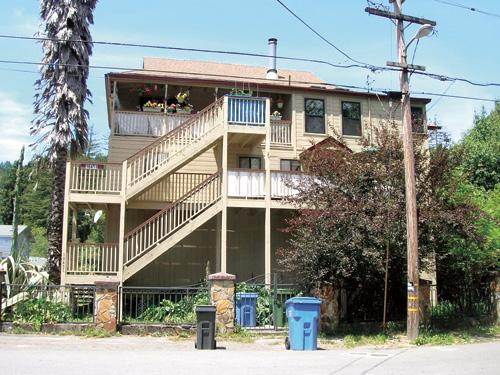GUERNEVILLE — Concerns over a proposed downtown homeless
facility have prompted Guerneville business owners to host an
emergency meeting next Tuesday hoping to head off the project
slated for Mill Street
The Russian River Chamber of Commerce will host the July 13
meeting at Buck’s Restaurant where Chamber leaders are hoping to
persuade homeless facility advocates to reconsider a transitional
housing facility for the homeless to be located near several
visitor-serving businesses including Buck’s, the historic
restaurant and bar, which is almost right next door.
“We’re certainly not against the homeless,” said Russian River
Chamber of Commerce President Margaret Kennett, but business owners
as well as nearby residents say the proposed project on Mill Street
will bring more harm than good to Guerneville’s struggling downtown
business district.
“There’s still room for dialogue,” said Kennett. “That’s what we
want.”
The emergency meeting follows a decision last week by the board
of Community Housing Opportunities West (CHOW), to move forward
with the purchase of the Mill Street house where up to 10 homeless
people would be housed if the project gets approved.
Representatives from the Chamber, CHOW and other homeless
advocates and county social services personnel have been meeting
since April to talk about ways to address the town’s expanding
homeless population, as well as issues associated with the downtown
area’s collection of derelicts, panhandlers and idle youth.
Kennett said the business community wants to help solve the
homeless issues but the Mill Street residence is not really the
best the way to go.
A downtown working group asked CHOW to hold off on the Mill
Street project and instead work with the Chamber to create a
Russian River Human Development Center that could provide drop-in
support services such as showers, meals, internet access and
emergency shelter.
The River Chamber also began circulating petitions this week
objecting to the Mill Street project as well as other homeless
shelters or housing in general in the central downtown residential
and commercial tourist area bordered on the north by Mill Court and
on the south by the Russian River and from the Highway 116 Bridge
west to Solar Ridge Road.
“Providing shelter or housing for the homeless in our downtown
area near bars, clubs and struggling businesses is not workable and
will harm our teetering economy as well as our small-town
residential and tourist climate,” says the petition.
“We support a collaborative process with community input to
create a multi-use facility” for homeless support services, “but
not in our downtown residential and tourist area,” says the
petition that will be turned over to 5th District Supervisor Efren
Carrillo next week.
The Chamber’s petition and emergency meeting follows a decision
last week by CHOW announcing plans will go forward on the Mill
Street project that is set to close escrow next month.
CHOW’s board chairwoman Amber Twitchell said she will be on hand
next week and hopes to see progress on both the chamber’s homeless
services proposal as well as the Mill Street project.
“We would love to work on a multiple services project but we
believe permanent supportive housing is part of the solution too,”
said Twitchell.
Supportive housing similar to what is proposed on Mill Street
has worked elsewhere to get people off the street, improve property
values and reduce crime, said Twitchell.
“All of these are happening in every part of the county except
the River area,” said Twitchell.
“These projects have been successful all over the place. We’re
talking about permanent supportive housing with services 24 hours a
day” to help residents stabilize their lives and work toward
specific goals such as employment, said Twitchell.
“This isn’t about homeless people walking up and down the street
and coming in to use the showers and hanging out drinking,” said
Twitchell.
“This is 10 people living in a house with supervision and
supportive services. This would move them from living under the
bridge in Guerneville to living in a home,” said Twitchell.
“There are rules,” said Twitchell. “It is a clean and sober
environment. They have to want to get off the streets.”
Funding for the project will come from the county’s share of
federal Housing and Urban Development support for homeless services
that includes operating costs for permanent supportive housing.
Regarding next Tuesday’s meeting, “I think its good that we
continue to talk,” said Twitchell.
No one is going to be moving into the Mill Street housing soon.
The project needs county Board of Supervisors OK because it will
rely on Community Development Commission funds, existing tenants
would be relocated and improvements to the building will be needed.
The whole process could take 18 months, said Twitchell.
68.4
F
Healdsburg
January 23, 2025








